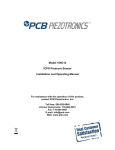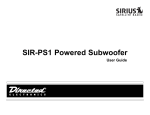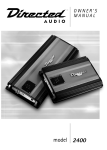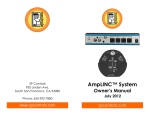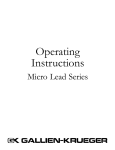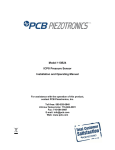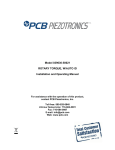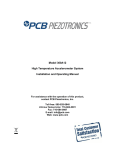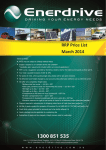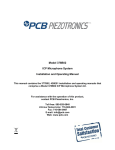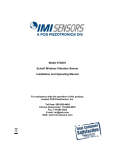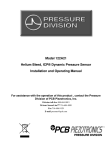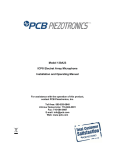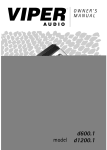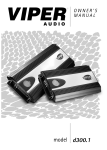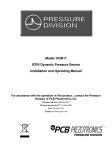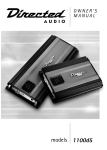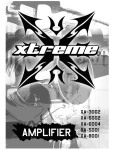Download Model 105C12 ICP® Pressure Sensor Installation and Operating
Transcript
Model 105C12 ICP® Pressure Sensor Installation and Operating Manual For assistance with the operation of this product, contact PCB Piezotronics, Inc. Toll-free: 800-828-8840 24-hour SensorLine: 716-684-0001 Fax: 716-684-0987 E-mail: [email protected] Web: www.pcb.com Warranty, Service, Repair, and Return Policies and Instructions The information contained in this document supersedes all similar information that may be found elsewhere in this manual. Total Customer Satisfaction – PCB Piezotronics guarantees Total Customer Satisfaction. If, at any time, for any reason, you are not completely satisfied with any PCB product, PCB will repair, replace, or exchange it at no charge. You may also choose to have your purchase price refunded in lieu of the repair, replacement, or exchange of the product. Service – Due to the sophisticated nature of the sensors and associated instrumentation provided by PCB Piezotronics, user servicing or repair is not recommended and, if attempted, may void the factory warranty. Routine maintenance, such as the cleaning of electrical connectors, housings, and mounting surfaces with solutions and techniques that will not harm the physical material of construction, is acceptable. Caution should be observed to insure that liquids are not permitted to migrate into devices that are not hermetically sealed. Such devices should only be wiped with a dampened cloth and never submerged or have liquids poured upon them. Repair – In the event that equipment becomes damaged or ceases to operate, arrangements should be made to return the equipment to PCB Piezotronics for repair. User servicing or repair is not recommended and, if attempted, may void the factory warranty. Calibration – Routine calibration of sensors and associated instrumentation is recommended as this helps build confidence in measurement accuracy and acquired data. Equipment calibration cycles are typically established by the users own quality regimen. When in doubt about a calibration cycle, a good “rule of thumb” is to recalibrate on an annual basis. It is also good practice to recalibrate after exposure to any severe temperature extreme, shock, load, or other environmental influence, or prior to any critical test. PCB Piezotronics maintains an ISO9001 certified metrology laboratory and offers calibration services, which are accredited by A2LA to ISO/IEC 17025, with full traceablility to N.I.S.T. In addition to the normally supplied calibration, special testing is also available, such as: sensitivity at elevated or cryogenic temperatures, phase response, extended high or low frequency response, extended range, leak testing, hydrostatic pressure testing, and others. For information on standard recalibration services or special testing, contact your local PCB Piezotronics distributor, sales representative, or factory customer service representative. Returning Equipment – Following these procedures will insure that your returned materials are handled in the most expedient manner. Before returning any equipment to PCB Piezotronics, contact your local distributor, sales representative, or factory customer service representative to obtain a Return Materials Authorization (RMA) Number. This RMA number should be clearly marked on the outside of all package(s) and on the packing list(s) accompanying the shipment. A detailed account of the nature of the problem(s) being experienced with the equipment should also be included inside the package(s) containing any returned materials. PCB for a complete statement of our warranty. Expendable items, such as batteries and mounting hardware, are not covered by warranty. Mechanical damage to equipment due to improper use is not covered by warranty. Electronic circuitry failure caused by the introduction of unregulated or improper excitation power or electrostatic discharge is not covered by warranty. A Purchase Order, included with the returned materials, will expedite the turn-around of serviced equipment. It is recommended to include authorization on the Purchase Order for PCB to proceed with any repairs, as long as they do not exceed 50% of the replacement cost of the returned item(s). PCB will provide a price quotation or replacement recommendation for any item whose repair costs would exceed 50% of replacement cost, or any item that is not economically feasible to repair. For routine calibration services, the Purchase Order should include authorization to proceed and return at current pricing, which can be obtained from a factory customer service representative. Contact Information – International customers should direct all inquiries to their local distributor or sales office. A complete list of distributors and offices can be found at www.pcb.com. Customers within the United States may contact their local sales representative or a factory customer service representative. A complete list of sales representatives can be found at www.pcb.com. Toll-free telephone numbers for a factory customer service representative, in the division responsible for this product, can be found on the title page at the front of this manual. Our ship to address and general contact numbers are: Warranty – All equipment and repair services provided by PCB Piezotronics, Inc. are covered by a limited warranty against defective material and workmanship for a period of one year from date of original purchase. Contact DOCUMENT NUMBER: 21354 DOCUMENT REVISION: B ECN: 17900 PCB Piezotronics, Inc. 3425 Walden Ave. Depew, NY 14043 USA Toll-free: (800) 828-8840 24-hour SensorLineSM: (716) 684-0001 Website: www.pcb.com E-mail: [email protected] OPERATION MANUAL FOR MINIATURE ICP PRESSURE SENSOR 105A AND 105C SERIES 1.0 INTRODUCTION This model series is designed to satisfy the need for measurement of dynamic pressures where space is limited, such as in model testing. The series consists of three basic mechanical configurations or styles, each featuring a .099” diameter diaphragm and each with a built-in impedance-converting amplifier for simple, convenient, two-wire, low-impedance operation. 2.0 DESCRIPTION The Series 105A sensors utilize two quartz discs in a thickness compression mode to produce a highimpedance level signal which is impressed across the input of a microminiature impedance converter built into the sensor housing. 3.1 MODEL 105A This is the smallest of the three styles and it is supplied in only the 100 psi range. The Model 105A is normally mounted using Model 060A04 Clamp Nut (supplied); however, if lack of space precludes the use of the clamp nut, the sensor may be epoxied in place if necessary. Do not over torque clamp nut, as to do so may distort the body of the sensor and affect the sensitivity of the device. The electrical connection to this model is made by soldering the positive (center conductor) lead from the power unit to the .040 diameter solder terminal provided. (IMPORTANT! The signal is superimposed upon a +11 volt (nominal) bias level at the amplifier output and is normally decoupled from the bias voltage in the power unit. This signal can be fed directly into most common readout instruments such as oscilloscopes, digital voltmeters, AC meters, peak meters, recorders, etc. The output impedance is less than 100 ohms. See Section 8.0, page 4) NOTE: Do not overheat this terminal. Use a small iron with only enough heat to obtain good solder joint. The electrical ground return is made to the sensor body. This connection can be made by attaching electrically to the structure or by using the metal ribbon spotwelded to the sensor body. Consult guide G-0001B "General Guide to ICP Instrumentation" for a more complete treatment of the ICP (Integrated Circuit Piezoelectric) principle. 3.2 3.0 This style utilizes a 10-32 external thread to facilitate mounting. It is supplied in three full-scale ranges: 100, 1000 and 5000 psi. INSTALLATION Because of the miniature size of these units, extra care should be exercised in preparation of mounting ports and in installation of sensors into the ports. Individual dimensional, performance and installation drawings are included in the manual for each particular model. Adhere carefully to instructions on these drawings. It is not necessary to use low-noise treated coaxial cable as with high-impedance type sensors. PCB Model 002A Cable is recommended. Drawing Number: 21106 Revision: NR MODELS 105C02, C12 & C22 Prepare mounting port in accordance with installation drawing provided in manual. Do not over torque. Use only enough torque to obtain a seal. The electrical connection is made via a 5-44 coaxial connector. Use coaxial 002G10 cable, 5-44 to 10-32 microdot. 1 OPERATION MANUAL FOR MINIATURE ICP PRESSURE SENSOR 105A AND 105C SERIES 3.3 MODELS 105C03, C13, 23, C33, C43 This style is the largest and is supplied in five models with full-scale ranges to 100, 1000, 5000, 10,000 and 30,000 psi. The electrical connection to this style sensor is made via a 10-32 coaxial connector. 3.4 FLASH TEMPERATURE PROTECTION It is good practice to protect the diaphragm against flash thermal effects, especially when flush-mounted, to minimize spurious outputs generated by high heat influx due to blasts, high compression heating, etc. One or more layers of black vinyl electrical tape on the diaphragm can be useful for this purpose in many cases. RTV-type silicone rubber has also proven effective. Experimentation is the best method for determination of effectiveness of protective material for each sensor application. 3.5 2 Because of its one-piece machined diaphragm construction, the 105A series is sensitive over its entire frontal area. Use extreme care when preparing recessed installation port to ensure that no particles, burrs or other residue are entrapped in the .010” gap ahead of the diaphragm. Force on the diaphragm due to such entrapped particles may change the calibration of the sensor. Recessed mounting protects the sensor diaphragm from the effects of high-flash temperatures and particle impingement due to blast effects, thereby prolonging sensor life. The limitation is that this type of installation lies in the high-frequency limiting effects of the passage, due to its length. The passage behaves like an underdamped second order system, the resonant frequency being determined by the passage length. This can have a limiting effect on pressure pulse rise time while causing passage ringing in cases where the passage is too long with respect to pulse rise time. (See chart below.) The following relationship determines this resonant frequency (fr): RECESSED INSTALLATION If ultra-high frequency response is not needed, it is good practice to use a recessed diaphragm installation. fr V 4L (Hz) (Eq. 1) Where: fr = Resonant frequency of passage (Hz) V = Velocity of sound in air (ft/sec) L = Length of column (ft) For air at room temperature, (Eq. 1) becomes: fr 3300 L Where L = Passage length (in.) .010 Gap .060 Dia. Passage Passage Length Typical Recessed Installation Drawing Number: 21106 Revision: NR OPERATION MANUAL FOR MINIATURE ICP PRESSURE SENSOR 105A AND 105C SERIES The natural frequency and approximate fastest pressure step rise time for various length passages is shown in the following chart. (Medium, air at 25C). PASSAGE LENGTH (in.) PASSAGE RESONANCE (kHz) .050 .100 .200 .50 1.0 66 33 16.5 6.6 3.3 APPROX. FASTEST PULSE RISE TIME (u Sec) 5 10 20 50 100 002A Cable 3 Model 480A Signal Conditioner XDCR Scope To Readout XDCR Typical Circuit Connection (For 105C02,C03, C12, C13, C22, C23, C33, C43) Passage Resonance vs. Passage Length Actual resonant frequencies measured in practice may differ slightly from the chart values due to variations in the velocity of propagation of sound caused by changes in temperature and pressure of the medium in the passage. For best matching of passage to diaphragm, maintain the .010” clearance ahead of the diaphragm as shown in Typical Recessed Installation figure. 4.0 OPERATION Connect sensor to signal conditioner as shown below, depending upon sensor style being used. Do not connect a power supply to these units without current limiting. To do so will destroy the built-in IC amplifier. All PCB signal conditioners feature fault-monitoring voltmeters on the front panel. During normal operation, the meter will indicate about mid-scale (+11 volts). If one of the connections to the sensor is open, the meter will read full scale (yellow area). Should a short occur on the sensor line, the meter will read 0 volts (red area). 5.0 Model 480A Signal Conditioner CALIBRATION Because of the relatively short discharge time constant of this series, static calibration means cannot be used. Fast dynamic means such as step function or pulse generators must be used instead. Solder Terminal XDCR Scope NOTE: All PCB signal conditioners for ICP sensor contain current-limiting circuitry to set the input current in the range of 2 to 20 mA. To Readout Contact the factory for help in solving specific calibration problems. 105A 6.0 2-Wire Cable 070A09 Solder Connector Adaptor Typical Circuit Connection (For 105A) Drawing Number: 21106 Revision: NR MAINTENANCE The small size and sealed construction of these sensors precludes field maintenance and repair. Should a problem develop, contact the factory for assistance. OPERATION MANUAL FOR MINIATURE ICP PRESSURE SENSOR 105A AND 105C SERIES 7.0 CAUTIONS 1. Do not apply voltage to the electrical terminals without current-limiting protection. 2. Do not apply more than 30 VDC to the sensor. 3. Do not put more than 20 mA current into the input terminals. 4. Do not overtorque sensors when installing. 5. Do not apply too much heat to the solder pin of style 1. 8.0 TERMINAL LEAD AND GROUND To eliminate any possibility of overheating the solder terminal and destroying the microamplifier in the sensor, a 2.0 inch long insulated wire has been provided on the solder terminal for soldering a connector lead from the power unit. The ground return is provided by a metal ribbon (.003 x .020) welded to the Model 060A04 clamp nut. ICP is a registered trademark of PCB Piezotronics Drawing Number: 21106 Revision: NR 4










